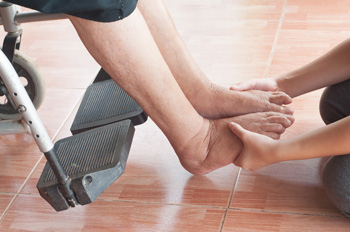Items filtered by date: December 2021
What Do Podiatrists Do?
Podiatrists are medical professionals who diagnose, treat, and offer preventative care for problems that affect the feet, ankles, and lower legs. Podiatrists may treat various foot and ankle injuries, such as plantar fasciitis, ankle sprains, and stress fractures. They can also address foot deformities, such as bunions, and skin or nail conditions like athlete’s foot or fungal toenails. A podiatrist might play a major role in a patient’s care if they have diabetes, poor circulation, or neuropathy, as these conditions frequently affect the feet. Some podiatrists are also trained in surgery. If you have developed a foot or ankle problem, it is suggested that you consult with a podiatrist.
If you are dealing with pain in your feet and ankles, you may want to seek help from a podiatrist. Feel free to contact one of our podiatrists from Advanced Ankle & Foot Surgeons. Our doctors can provide the care you need to keep you pain-free and on your feet.
What Is a Podiatrist?
A podiatrist is a doctor of podiatric medicine who diagnoses and treats conditions of the foot, ankle, and related structures of the leg. Your podiatrist may specialize in a certain field such as sports medicine, wound care, pediatrics, and diabetic care. Podiatrists have the ability to become board certified through training, clinical experience, and then taking an exam.
What Do Podiatrists Do?
On a daily basis, a podiatrist may perform the following activities:
- Diagnose foot ailments such as ulcers, tumors, fractures, etc.
- Use innovative methods to treat conditions
- Use corrective orthotics, casts, and strappings to correct deformities
- Correct walking patterns and balance
- Provide individual consultations to patients
It is very important that you take care of your feet. It’s easy to take having healthy feet for granted, however foot problems tend to be among the most common health conditions. Podiatrists can help diagnose and treat a variety of feet related conditions, so it is crucial that you visit one if you need assistance.
If you have any questions please feel free to contact our office located in O'Fallon, and New Baden, IL . We offer the newest diagnostic and treatment technologies for all your foot and ankle needs.
What Do Podiatrists Do?
Podiatrists are physicians, and often surgeons, who have studied the foot, ankle, and lower leg, along with all associated ailments. They have received an undergraduate degree as well as medical degree and undergo four years of postgraduate study with a three-year residency. They treat a variety of foot and ankle issues, including fungal and ingrown toenails, heel pain, fractures, ankle sprains and strains, nerve damage (neuromas), bunions, hammertoe, arthritis, wound care, and complications of the feet due to diabetes and peripheral artery disease, and much more. They can also perform surgeries to treat certain foot and ankle conditions, perform gait analyses, and fit and create custom orthotics for their patients. If you experience any discomfort in your feet or ankles or are having a hard time getting around, make an appointment with a podiatrist who can get to the bottom of your condition and treat it accordingly.
Wound care is an important part in dealing with diabetes. If you have diabetes and a foot wound or would like more information about wound care for diabetics, consult with one of our podiatrists from Advanced Ankle & Foot Surgeons. Our doctors will assess your condition and provide you with quality foot and ankle treatment.
What Is Wound Care?
Wound care is the practice of taking proper care of a wound. This can range from the smallest to the largest of wounds. While everyone can benefit from proper wound care, it is much more important for diabetics. Diabetics often suffer from poor blood circulation which causes wounds to heal much slower than they would in a non-diabetic.
What Is the Importance of Wound Care?
While it may not seem apparent with small ulcers on the foot, for diabetics, any size ulcer can become infected. Diabetics often also suffer from neuropathy, or nerve loss. This means they might not even feel when they have an ulcer on their foot. If the wound becomes severely infected, amputation may be necessary. Therefore, it is of the upmost importance to properly care for any and all foot wounds.
How to Care for Wounds
The best way to care for foot wounds is to prevent them. For diabetics, this means daily inspections of the feet for any signs of abnormalities or ulcers. It is also recommended to see a podiatrist several times a year for a foot inspection. If you do have an ulcer, run the wound under water to clear dirt from the wound; then apply antibiotic ointment to the wound and cover with a bandage. Bandages should be changed daily and keeping pressure off the wound is smart. It is advised to see a podiatrist, who can keep an eye on it.
If you have any questions, please feel free to contact our office located in O'Fallon, and New Baden, IL . We offer the newest diagnostic and treatment technologies for all your foot care needs.
Who Is Most at Risk for Age-Related Foot Problems?
Aging is a natural risk factor for many foot problems, including bunions, corns, calluses, hammertoes, ingrown toenails, fungal infections, diabetic foot problems, arthritis, heel pain, tarsal tunnel syndrome, and more. This is because as you age, your feet tend to spread and lose the fatty padding that cushions them. People with certain underlying medical conditions such as diabetes, arthritis, neuropathy, and congenital foot deformities may be more likely to develop foot problems. Specific lifestyle factors like wearing ill-fitting shoes, standing for prolonged periods of time, walking on hard surfaces, and being overweight can all contribute to the risk of foot problems. While medical risk factors are often outside of one’s control, lifestyle factors can usually be modified to prevent potential foot issues. For more information about aging and foot health, it is suggested that you consult with a podiatrist.
If you need your feet checked, contact one of our podiatrists of Advanced Ankle & Foot Surgeons. Our doctors will attend to all of your foot and ankle needs and provide you with quality treatment.
Geriatrics and Podiatry
When people age, some common issues that may occur are bone density loss, dry skin, poor circulation, and rough brittle nails. These issues may also affect your foot health if the necessary steps are not taken to alleviate the problems.
It is important to take care of your feet because feet that are injured or diseased can affect your overall health. Having painful feet hinders your ability to do daily activities or may decrease your willingness to do the things that you need to do.
Visiting Your Geriatrician
As we age, health problems become more likely, so it is essential to visit your doctor for check-ups to ensure that you are doing the best you can to take care of your health. It is recommended to check your feet frequently for any possible cuts, bruises, swelling, corns or any other irregularities.
Taking Care of Elderly Feet
Cracked or dry feet can be treated by applying moisturizer often. It is also important not to wear old socks because the older the sock is, the higher the possibility there will be that there is bacteria there. Wear fresh socks and make sure they fit properly.
Proper foot health means that you can have a more active lifestyle and you will not be bogged down by pain. Foot health also leads to good circulation, which is paramount for overall health.
If you have any questions, please feel free to contact our office located in O'Fallon, and New Baden, IL . We offer the newest diagnostic tools and technology to treat your foot and ankle needs.
Arthritis Can Cause Pain in the Feet and Ankles
Indications of Plantar Fasciitis
 If you have heel pain that is worse in the morning, after long periods of standing, or after working out, you may have plantar fasciitis. Plantar fasciitis is a result of inflammation or a partial tearing of the tissue band that runs along the bottom of the foot, known as the plantar fascia. Plantar fasciitis is normally an overuse injury that comes from activities that put stress on the plantar fascia (like running). Because of this, the pain from plantar fasciitis usually gets worse over time. Other factors that may lead to plantar fasciitis include obesity, flat feet, high arches, or tight calf muscles. Because of the negative impact that plantar fasciitis can have on everyday activities, patients that are struggling with heel pain should consult with a podiatrist for a proper diagnosis and treatment plan.
If you have heel pain that is worse in the morning, after long periods of standing, or after working out, you may have plantar fasciitis. Plantar fasciitis is a result of inflammation or a partial tearing of the tissue band that runs along the bottom of the foot, known as the plantar fascia. Plantar fasciitis is normally an overuse injury that comes from activities that put stress on the plantar fascia (like running). Because of this, the pain from plantar fasciitis usually gets worse over time. Other factors that may lead to plantar fasciitis include obesity, flat feet, high arches, or tight calf muscles. Because of the negative impact that plantar fasciitis can have on everyday activities, patients that are struggling with heel pain should consult with a podiatrist for a proper diagnosis and treatment plan.
Plantar fasciitis can be very painful and inconvenient. If you are experiencing heel pain or symptoms of plantar fasciitis, contact one of our podiatrists from Advanced Ankle & Foot Surgeons. Our doctors can provide the care you need to keep you pain-free and on your feet.
What Is Plantar Fasciitis?
Plantar fasciitis is the inflammation of the thick band of tissue that runs along the bottom of your foot, known as the plantar fascia, and causes mild to severe heel pain.
What Causes Plantar Fasciitis?
- Excessive running
- Non-supportive shoes
- Overpronation
- Repeated stretching and tearing of the plantar fascia
How Can It Be Treated?
- Conservative measures – anti-inflammatories, ice packs, stretching exercises, physical therapy, orthotic devices
- Shockwave therapy – sound waves are sent to the affected area to facilitate healing and are usually used for chronic cases of plantar fasciitis
- Surgery – usually only used as a last resort when all else fails. The plantar fascia can be surgically detached from the heel
While very treatable, plantar fasciitis is definitely not something that should be ignored. Especially in severe cases, speaking to your doctor right away is highly recommended to avoid complications and severe heel pain. Your podiatrist can work with you to provide the appropriate treatment options tailored to your condition.
If you have any questions please feel free to contact our office located in O'Fallon, and New Baden, IL . We offer the newest diagnostic and treatment technologies for all your foot and ankle needs.




